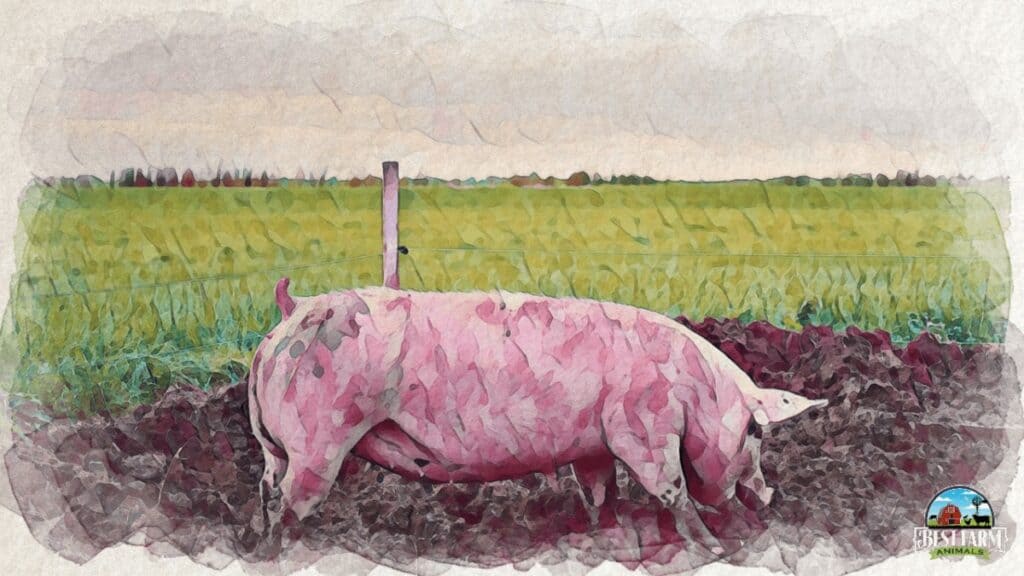Is your pig breathing hard? It’s natural to worry when you notice something out of the ordinary. But don’t panic just yet, as this might be happening for a few different reasons. You may be in a similar incident as ours.
My little pig Gus is an absolute darling. He was the runt of the litter. His mother sadly wanted nothing to do with him. So my husband and I decided to let Gus live indoors with us. He is a very spoiled little piggy, and we adore him.
Recently, I noticed my pig, Gus snoring a lot when he took a nap or settled down for the night. The sound got so bad that it woke us up. I turned Gus onto his side, but this didn’t seem to help. Then I noticed him breathing oddly (and almost with difficulty) when he moved around our house.
Concerned for my little Gus-Gus, I contacted our local vet to find out what could be causing this odd breathing. She suggested I bring him in so she could look at him and diagnose him accordingly.
Why is my pig breathing hard ? Pigs breathe hard because of heat stress, upper respiratory tract infections, and over-excitement while waiting for food. Agitation, obesity, and lungworm infestation can also be the causes of heavy pig breathing. A worrisome cause for labored pig breathing is if your pig has inhaled toxic gasses through manure gas poisoning.
7 Reasons Pigs Breathe Hard and What to Do About It
I was very scared when the vet was examining my Gus. In this article, I’ll cover what my vet said. Here are seven reasons your pig’s breathing is heavy and what you can do about it. I’ll also cover how to pinpoint the symptoms, and how to treat your dear pig accordingly:
1. Heat Stress Results to Pig Breathing Heavy
If it’s hot at your house, your pig may be suffering from heat stress.
What are signs of heat stress in pigs? Heat stress can cause your pig to take shallow breaths, make high-pitched noises, and pant. Other signs that a heavy breathing pig suffers from heat stress are vomiting, lethargy, increased water intake and excessive panting. They may also show symptoms like eating less food, lying down in shady spots while panting, milk production reduction (for sows) and weak body. You might notice muscle trembling.
When your pig experiences an internal temperature increase (rectal temperature of over 109F), their body heat exceeds its ability to cool down. Unfortunately, your pig cannot sweat and will start panting. This point is known as the “heat stress emergency point,” and this is a point you want to avoid.
Pigs have tiny lungs compared to the size of their body. Therefore panting only helps a little as far as cooling down goes. All this does is further aggravate the problem. If your pig continues to do this, avoid increasing the heat cycle, which can lead to death.
Heat stress in pigs can also be caused by prolonged exposure to strong sunlight (UV intensity) and high tempatures. In some cases, heat stress is the result of poor ventilation, overpopulated living environment, and high humidity levels.
Having too many pigs in a small area can also cause heat stress due to each pig’s body heat. A herd of pigs can generate quite a lot of heat.
Good to know: Sunburn and heat stress are entirely different conditions. Sunburn is caused by prolonged exposure to sunlight, while heat stress is caused by your pig’s inability to cool down from the heat.
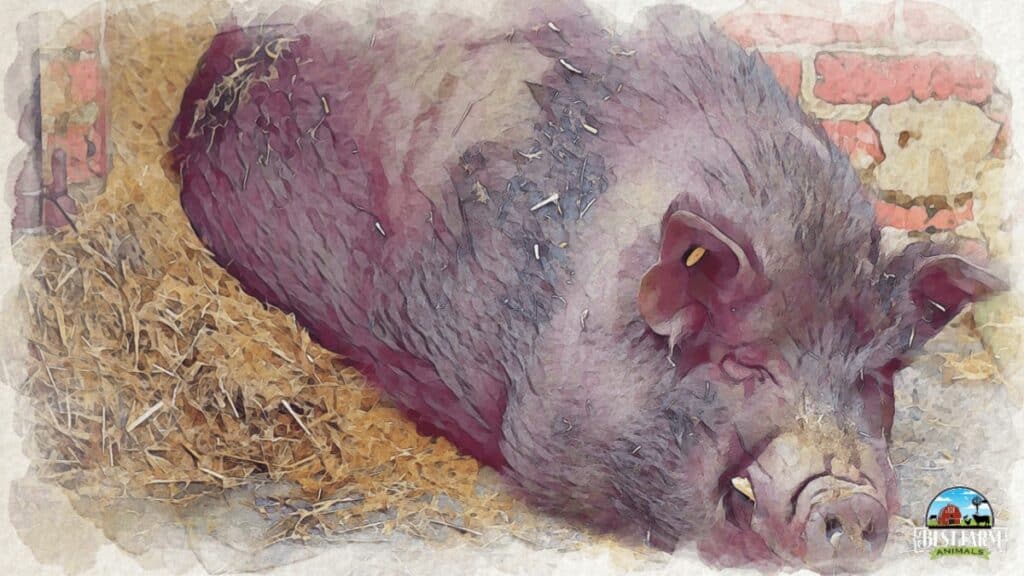
How to Prevent Heat Stress in Pigs
Ensure your pig has access to a wallow to lie in the mud. This will help bring down their temperature.Separate your pigs’ water and wallow areas, as drinking muddy water isn’t safe for your pig.
Allow your pigs to move around shady areas. If you don’t have enough trees, set up artificial structures to provide shade, such as tarpaulin stretched over poles.
Place a cool (not freezing) wet towel on your pig’s neck and back. Change the towel often so that it remains cool.
Dribble cold water into your pig’s rectum.
Provide your pig with electrolytes.
Spray diluted vinegar on your pig’s skin to remove the heat.
2. Upper Respiratory Tract Infection Causes Pig Breathing Funny
Pigs with an upper respiratory tract infection often breath funny and disease display symptoms like shortness of breath and a distinct wheezing sound and persistent dry cough. You may notice odd breathing, sneezing or labored breaths. They also suffer from reduced growth rate and continuous sneezing with mucus discharge.
Upper respiratory tract infections are common in pigs throughout the year. However, these viruses are rife during the late fall and winter months. If you notice your pig breathing oddly, coughing, or wheezing, this could signify an upper respiratory tract infection such as mycoplasmal pneumonia.
Many upper respiratory tract infections can cause your pig to breathe funny, such as Swine influenza (or flu), Porcine Circovirus, Bordetella bronchiseptica, and Aujeszky’s disease. It’s important to note that most upper respiratory tract infections are contagious and spread quickly through the herd by direct contact with an infected pig or as an aerosol.
How to Treat Upper Respiratory Tract Infection in Pigs
There is no effective treatment to eliminate an upper respiratory tract infection. You can, however:
Give your pig antibiotics to ease the unpleasant symptoms. If your pig is ill, it’s best to seek veterinary advice for the best care solution as soon as possible.
Pigs with severe cases are usually injected with long-acting oxytetracycline (OTC), Penicillin, Streptomycin, or Valnemulin.
Ensure your pigs are vaccinated, keep their living area clean, and avoid overcrowding your pig’s living environment. Remember, prevention is always better than cure.
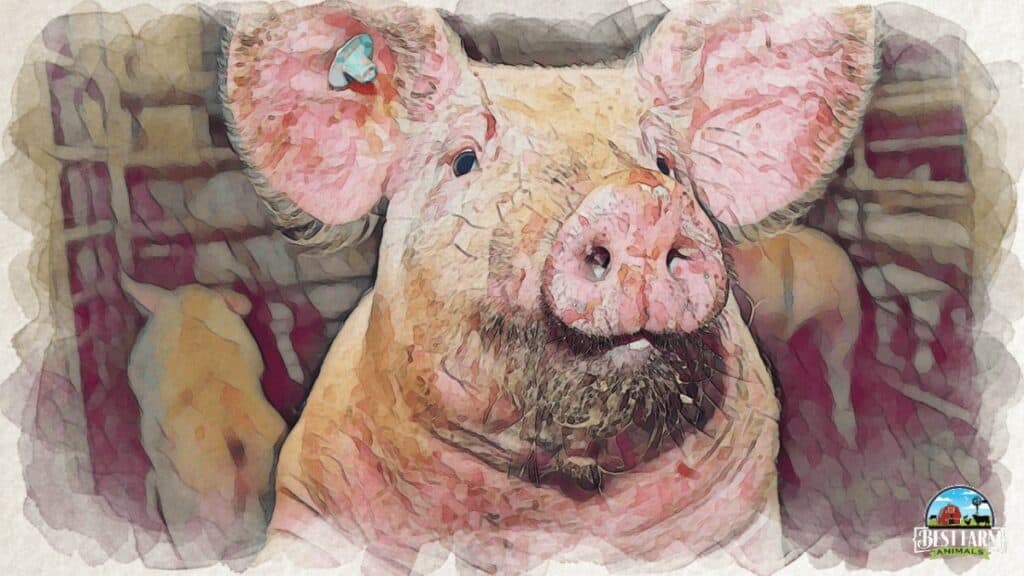
3. Pig Keeps Opening His Mouth Due to Anticipation of Food
Pigs, like all animals, love food. They usually get excited immediately if they catch a whiff of their food. They will start taking deep breaths while opening its mouth and licking their lips in anticipation of their food.
If you take too long to deliver their food to them, pigs can get pretty angry and develop food aggression problems such as squealing or biting the other pigs (or you) to get their food first.
A hungry pig usually grind its teeth, paces up and down in anticipation, and its eyes always watch the other pigs to ensure they don’t get to the food first. Most starving pigs also take deep breaths and sniffing at the air, drools and licks their lips, squel loudly at mealtime, or make a grunting noise to show excitement over food.
Some pet pigs even ram their owners in the legs if they aren’t quick enough to feed their pigs.
Once your pig has their food, you’ll notice them making a frenzied gulping noise, and they barely stop to take a breath between bites.
If you have more than one pig, they will gulp down their food faster, getting more food than the other pig. This food-excited-gulping may cause a stress-based breathing condition.
To eat like a pig is such an accurate phrase regarding pigs’ eating habits. When someone says this phrase, they mean you eat noisily and greedily (probably with your mouth open).
Steps to Take If You Have a Hungry Pig
Ensure you give your pig a healthy balanced diet that includes fruits and vegetables, grains, distilling mash, and pig-safe scraps from your table (pigs love scraps).
Create a routine when feeding your pigs, and try to feed them simultaneously every day.
If your pigs fight, consider separating them when you feed them to prevent unnecessary fighting.
Never feed your pig at your table, which creates a bad habit. Besides, you don’t want your pig sitting next to you at dinner, breathing deeply as they wait for a taste.
Make sure your pig is eating enough food. If you’re unsure of the amount your pig should be eating for their weight, then take them to the vet for some advice (though the average for adult pigs is five to seven pounds of food per day). A hangry (hungry + angry) pig is not a friendly pig.
Install automatic feeders. This can also help stop fighting between your herd, and your pig won’t be over-hungry during mealtime.
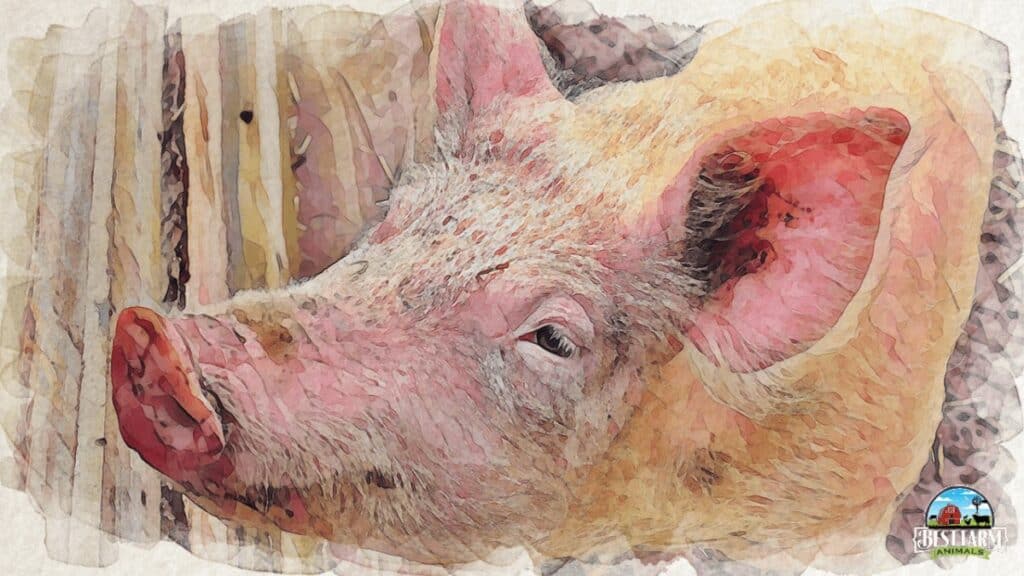
4. Pigs Chomped Their Teeth When Feeling Agitated
Your pig is capable of feeling big feelings, too, like agitation. Like humans, pigs can become agitated when someone enters their personal space. An agitated pig can be pretty dangerous, so it’s wise to be cautious when you notice it is agitated or annoyed.
Pigs breathe heavy when agigated or feeling uncomfortable. They also have tense body, usually flick their tails, and their hair stands up on end. The pig will commonly chomp their jaws resulting to foaming at the mouth. It will also try to circle you and produce low grunting and deep breathing sounds.
Your pig can become agitated for various reasons, such aswhen’s there’s delay in receiving their food, change in routine, or you’re getting too close to their babies. They will also feel uncomfortable once they feel ill or in pain, you separated them from the herd and when they hear sudden loud noises or they’re caught by surprise.
Did you know: Pigs don’t have great eyesight, and you need to let them know you are there before barging into the pigsty or the area they are in.
Top Tip: If your pig displays any of these signs, especially flicking their tail and chomping loudly, you must get out of its space immediately, indicating they’re very agitated.
Steps to Take If Your Pig is Agitated
Back away from your pig’s personal space and living environment. Do this slowly so you don’t spook them further.
Avoid making any eye contact with your pig, and try to get some distance between you and them.
Never turn your back on your pig and try to run away. This will further aggravate the already tense situation. Your pig will run after you and try to knock you off your feet.
Stick to your pig’s daily routine and avoid making any drastic changes.
Avoid making loud sounds around your pig. If you suspect your pig is ill, seek veterinary advice immediately.
5. Overweight or Obese Pig is Panting
One of the biggest causes for a pig breathing oddly or panting is when they’re overweight or obese. Pigs are naturally food-driven animals. They love to eat, and if the food is available (no matter the amount), they will eat it.
There are several signs that a pig is obese such as when it seems depressed, uninterested in interacting with other pigs or their owner, labored breathing, or when its tail doesn’t move that much. Obese pigs also suffer from fat blindness or when a pig gets so fat that the skin rolls over its eyes, and it can’t see clearly.
Moreover, an overweight pig usually loses hearing due to the fat hanging over its ears, and when its belly drags on the ground when they walk. They also have faces that appear swollen with large jowls (bags of skin along the jawline).
As a pig owner, you must be careful not to overfeed your pig. Your pig can pick up weight very quickly and become obese in no time. It’s challenging for an obese pig to lose weight, especially when they’re used to eating many food and treats. As mentioned above, if your pig doesn’t receive their food in time, it can become agitated, stressed, and depressed.
Your pig is also at risk of developing obstructive sleep apnea. This disorder is caused by obesity and causes your pig’s breathing to stop and start repeatedly. It also causes your pig to snore more than usual.
How to Help an Obese Pig
It’s very dangerous for a pig to be obese as this negatively affects its health and mental well-being. Your pig won’t want to move around much because of difficulty breathing and moving. This causes their metabolism to slow down even more, resulting in more weight gain.
Follow these steps if your pig is obese:
Encourage your pig to move by scattering food on the floor and moving its food bowl further away from them.
Take your pig for short walks, and you can also use a harness.
Avoid giving your pig treats, grains, fruit, or vegetables. Instead, stick to regular pig food and any medication that has been prescribed.
Slowly decrease the amount of food your pig eats until they reach the desired weight. You can slowly increase it again.
Ensure your pig has enough water, and consider adding some Gatorade to the water to make it more enticing for your pig. This should help encourage them to get up and walk to the water bowl.
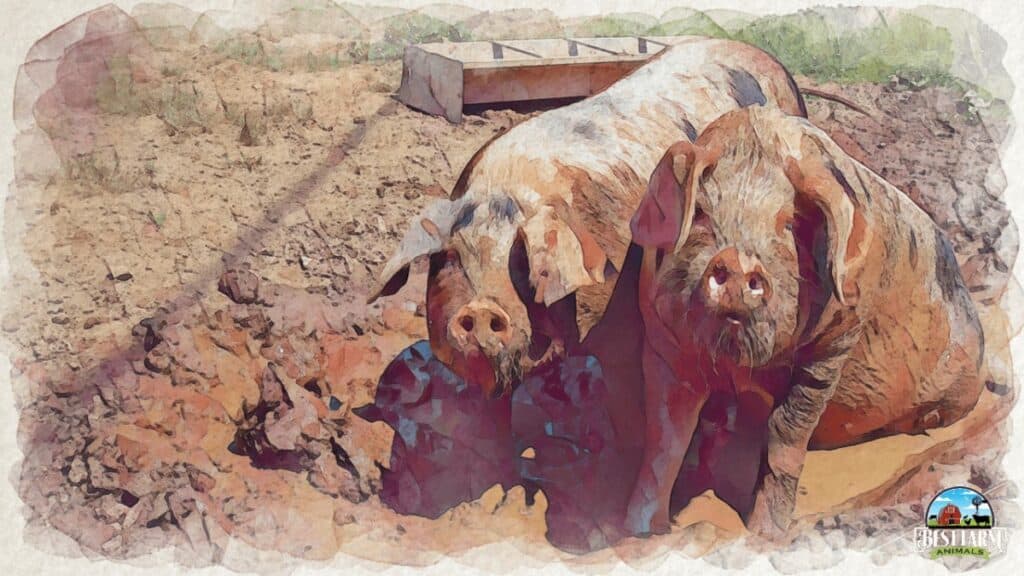
6. Manure Gas Poisoning Can Cause Pig Wheezing
One of the most lethal and dangerous causes of your pig breathing oddly, is manure gas poisoning. This is not only dangerous for your pigs, but it can be hazardous for you as well.
Exposure to these gasses can be fatal for your pig and even humans.
Pigs that suffer from manure gas poisoning usually produce wheezing sounds and are excessively coughing. They also sneeze a lot, show depression and weakness, or are overexcited caused by exposure to carbon dioxide. Usually, these pigs fall from coma or unconsciousness, have conjunctivitis or laryngospasm (spasm of the vocal cords), and suffer from immediate respiratory paralysis.
The four primary gasses found in pig manure are hydrogen sulphide (smells like rotten eggs), carbon dioxide, methane and ammonia. These gasses are the by-products of the decomposition of organic matter. If the manure has been standing for more than a week, then it’s safe to assume that these gasses are present in lethal quantities.
Obviously, the more pigs you have, the more gasses will be present. Manure gas poisoning happens when pig manure has stood for too long in a poorly ventilated area. Temperature and pH also play a role.
The waste breaks down and forms a liquid known as a slurry (a watery mixture of insoluble matter). When the manure is mixed or moved (or agitated), it releases large quantities of toxic gasses from the slurry.
If your pig inhales these harmful gasses, this causes them to become very ill, struggle to breathe, possibly pass out, and—worst case—die.
Warning: If your pig is exposed to high levels of carbon dioxide (40% CO2) for more than a few minutes, it may be at risk for death. Hydrogen sulphide loses the rotten egg smell once levels are over 500 ppm. This does not mean that the gas is no longer present. CO2 is a silent killer.
How to Help a Pig That Suffers from Manure Gas Poisoning
Evacuate your pigs immediately if exposed to these toxic gasses.
If your pig is unconscious, try to wake them up by stroking them and talking gently. Call your vet immediately and inform them of the poisoning. Place your pig on its back, slap the chest wall firmly, or perform the Heimlich maneuver.
Place the pig on its side, your hands behind its shoulders, and push downwards if steps above didn’t work. This should open an airway until the vet reaches you, or you can transport your pig to the vet.
Ensure your pig’s living area has adequate ventilation. Ventilation is always important for pigs to prevent any kind of poisoning or diseases.
No pigs should be in a pen when the manure is emptied.
Consider installing a multi-gas detector. This will indicate when gas levels are increasing.
7. Lungworm Infestation Causes Pig Coughing and Breathing Heavy
Lungworm infestation is another cause for your pig to breathe heavy and cough loudly. The pig will also suffer from weight loss, pneumonia, and rough hair coat. Pigs with lungworm infestation usually thump and their piglets will be smaller in size than normal.
Your pig may accidentally ingest earthworms while eating their food. The parasitized earthworms contain lungworm larvae. Once the larvae are in your pig’s system, they penetrate the intestinal tract and migrate from the lymphatic system to the lungs through the venous blood.
Did you know: that lungworm larvae can survive inside an earthworm for up to seven years?
Once these nasty parasites reach your pig’s lungs, they group, grow and produce more larvae (this starts 25 days after ingestion). Infestation can cause infection with other diseases, such as hog cholera and swine influenza.
How to Prevent Lungworm Infestation in Pigs
Administer drugs. Anthelmintics (drugs against parasitic infections) effectively kill the lungworm parasite. Drugs such as Abamectin, Ivermectin, Doramectin, fenbendazole, and Flubendazole can be administered.
Add Levamisole to their water. Adding Levamisole to your pig’s food and water will also help kill parasites.
Place them on a concrete floor. Raising pigs on concrete flooring greatly reduces the earthworm ingestion risk.
Move your pigs to another area for at least six months if there is a lungworm infestation on the land.
Pig Breathing Problems FAQs
If your pig is breathing oddly, you should take the time to quickly identify the problems. Make sure to isolate sick pigs to keep the rest of the herd healthier as many bacterial and viral infections can rapidly spread among pigs.
Is it Normal For Piglets to Sneeze?
It’s normal for piglets to sneeze. Piglets will start sneezing if they come into contact with dust or pollen that irritates their noses, which is entirely normal. However, if a piglet (from 1 week old) starts sneezing continuously, with snorting and nose bleeds, this may be an indication that they have Bordetellosis. Check it immediately.
Do Pigs Catch Colds?
Just like in humans, pigs can also catch colds from various flu viruses carried from infected humans, and other pigs and birds. Swine influenza is the most common reason for pigs getting colds. It’s best to keep an eye out for sick pigs as some illnesses don’t show symptoms. Pigs also catch colds throughout the year, especially during the late fall and winter months.
What Do You Do If Your Pigs Cough (or Are Sick)?
If your pig is coughing excessively, you should isolate them from the rest of the herd and give them electrolytes and fresh water to keep them hydrated. You should contact your local vet to provide treatment if the coughing persists. If your pig is sick, they may infect the other pigs through their cough droplets.
Conclusion
It’s essential to take your pig to the vet as soon as possible if the pig breathing is irregular. While there might be a few possible explanations for why your pig is breathing hard, only a licensed veterinarian can properly diagnose and treat the issue.
After a thorough check-up, my vet informed me that my little Gus was not so little. He was, in fact, obese. I was shocked to hear this, as I thought he looked so cute with his chubby and squeezable cheeks.
I knew Gus was on the chubby side, but I hadn’t realized just how much weight he was putting on. After discussing Gus’s daily routine and lifestyle with my vet, we realized that I was giving Gus way too many treats (a terrible habit indeed).
It’s so easy to fall into the trap of using treats to get them to take a bath or get into the car to see the vet. Gus is now on a diet until he loses enough weight. The vet advised that once he is in tip-top shape, we can reintroduce fruits and vegetables to his diet.
My Most Used Pig Supplies
This list contains affiliate products. Affiliate products do not cost more but helps to support BestFarmAnimals and our goal to provide farm animal owners with accurate and helpful information.
Purina Pig Chow will last well (or Mazuri is popular, but I haven’t tried it), and the stainless steel non-skid bowls that will help keep the mess down.
A pig blanket to keep her warm. This one also has bright colors and helps to provide rooting without the destruction.
Pig Harness for walking and handling your pig. There are a lot to choose from, but this one is pretty easy to use. If you want one that has a separate leash, this looks like a good one.
A large crate for keeping her safe in your house at night and when you leave the house. This is essential. You’ll also want a litterbox, and I like mine with a lid for nighttime. Pine shavings are best, and you may be able to find them in larger quantities locally.
When you have accidents, Odoban will help eliminate odors. When you are potty training, these floor pads work great for keeping your house clean while training her to go in certain places.
You’ll also want an outdoor house to keep her warm when she gets outside time, an essential part of her development.
Dewormer- Ivermectin is the primary dewormer I use, although I do rotate with a non-ivermect ingredient once so that the worms don’t get immune to it.
Resources:
Cell Process Journal:
Research Gate Published Study:
Behavioral Assessment of Emotionality in Pigs
Pub Med Central:

